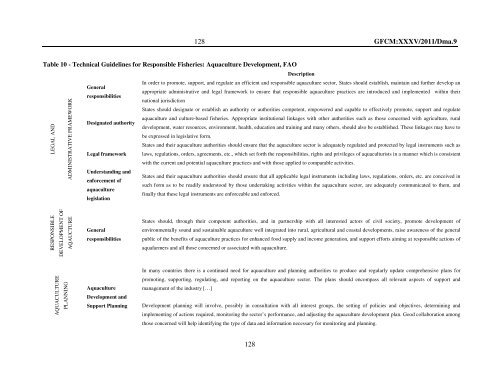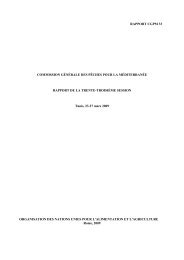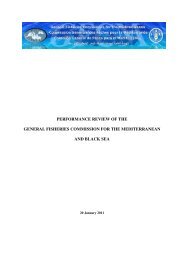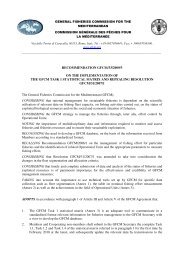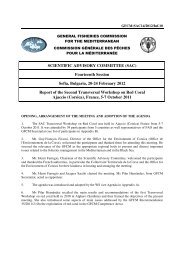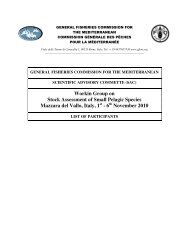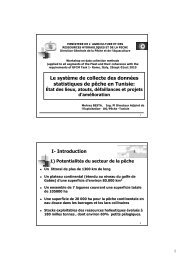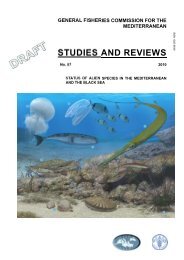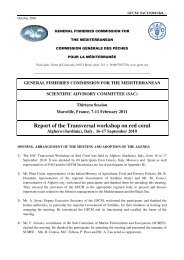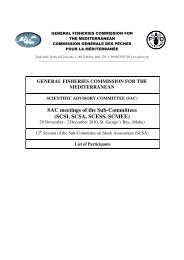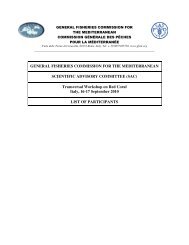Site selection and carrying capacity in Mediterranean ... - FAO Sipam
Site selection and carrying capacity in Mediterranean ... - FAO Sipam
Site selection and carrying capacity in Mediterranean ... - FAO Sipam
You also want an ePaper? Increase the reach of your titles
YUMPU automatically turns print PDFs into web optimized ePapers that Google loves.
Table 10 - Technical Guidel<strong>in</strong>es for Responsible Fisheries: Aquaculture Development, <strong>FAO</strong><br />
LEGAL AND<br />
RESPONSIBLE<br />
ADMINISTRATIVE FRAMEWORK<br />
DEVELOPMENT OF<br />
AQAUCTURE<br />
AQUACULTURE<br />
PLANNING<br />
General<br />
responsibilities<br />
Designated authority<br />
Legal framework<br />
Underst<strong>and</strong><strong>in</strong>g <strong>and</strong><br />
enforcement of<br />
aquaculture<br />
legislation<br />
General<br />
responsibilities<br />
Aquaculture<br />
Development <strong>and</strong><br />
Support Plann<strong>in</strong>g<br />
128 GFCM:XXXV/2011/Dma.9<br />
128<br />
Description<br />
In order to promote, support, <strong>and</strong> regulate an efficient <strong>and</strong> responsible aquaculture sector, States should establish, ma<strong>in</strong>ta<strong>in</strong> <strong>and</strong> further develop an<br />
appropriate adm<strong>in</strong>istrative <strong>and</strong> legal framework to ensure that responsible aquaculture practices are <strong>in</strong>troduced <strong>and</strong> implemented with<strong>in</strong> their<br />
national jurisdiction<br />
States should designate or establish an authority or authorities competent, empowered <strong>and</strong> capable to effectively promote, support <strong>and</strong> regulate<br />
aquaculture <strong>and</strong> culture-based fisheries. Appropriate <strong>in</strong>stitutional l<strong>in</strong>kages with other authorities such as those concerned with agriculture, rural<br />
development, water resources, environment, health, education <strong>and</strong> tra<strong>in</strong><strong>in</strong>g <strong>and</strong> many others, should also be established. These l<strong>in</strong>kages may have to<br />
be expressed <strong>in</strong> legislative form.<br />
States <strong>and</strong> their aquaculture authorities should ensure that the aquaculture sector is adequately regulated <strong>and</strong> protected by legal <strong>in</strong>struments such as<br />
laws, regulations, orders, agreements, etc., which set forth the responsibilities, rights <strong>and</strong> privileges of aquaculturists <strong>in</strong> a manner which is consistent<br />
with the current <strong>and</strong> potential aquaculture practices <strong>and</strong> with those applied to comparable activities.<br />
States <strong>and</strong> their aquaculture authorities should ensure that all applicable legal <strong>in</strong>struments <strong>in</strong>clud<strong>in</strong>g laws, regulations, orders, etc. are conceived <strong>in</strong><br />
such form as to be readily understood by those undertak<strong>in</strong>g activities with<strong>in</strong> the aquaculture sector, are adequately communicated to them, <strong>and</strong><br />
f<strong>in</strong>ally that these legal <strong>in</strong>struments are enforceable <strong>and</strong> enforced.<br />
States should, through their competent authorities, <strong>and</strong> <strong>in</strong> partnership with all <strong>in</strong>terested actors of civil society, promote development of<br />
environmentally sound <strong>and</strong> susta<strong>in</strong>able aquaculture well <strong>in</strong>tegrated <strong>in</strong>to rural, agricultural <strong>and</strong> coastal developments, raise awareness of the general<br />
public of the benefits of aquaculture practices for enhanced food supply <strong>and</strong> <strong>in</strong>come generation, <strong>and</strong> support efforts aim<strong>in</strong>g at responsible actions of<br />
aquafarmers <strong>and</strong> all those concerned or associated with aquaculture.<br />
In many countries there is a cont<strong>in</strong>ued need for aquaculture <strong>and</strong> plann<strong>in</strong>g authorities to produce <strong>and</strong> regularly update comprehensive plans for<br />
promot<strong>in</strong>g, support<strong>in</strong>g, regulat<strong>in</strong>g, <strong>and</strong> report<strong>in</strong>g on the aquaculture sector. The plans should encompass all relevant aspects of support <strong>and</strong><br />
management of the <strong>in</strong>dustry […]<br />
Development plann<strong>in</strong>g will <strong>in</strong>volve, possibly <strong>in</strong> consultation with all <strong>in</strong>terest groups, the sett<strong>in</strong>g of policies <strong>and</strong> objectives, determ<strong>in</strong><strong>in</strong>g <strong>and</strong><br />
implement<strong>in</strong>g of actions required, monitor<strong>in</strong>g the sector’s performance, <strong>and</strong> adjust<strong>in</strong>g the aquaculture development plan. Good collaboration among<br />
those concerned will help identify<strong>in</strong>g the type of data <strong>and</strong> <strong>in</strong>formation necessary for monitor<strong>in</strong>g <strong>and</strong> plann<strong>in</strong>g.


